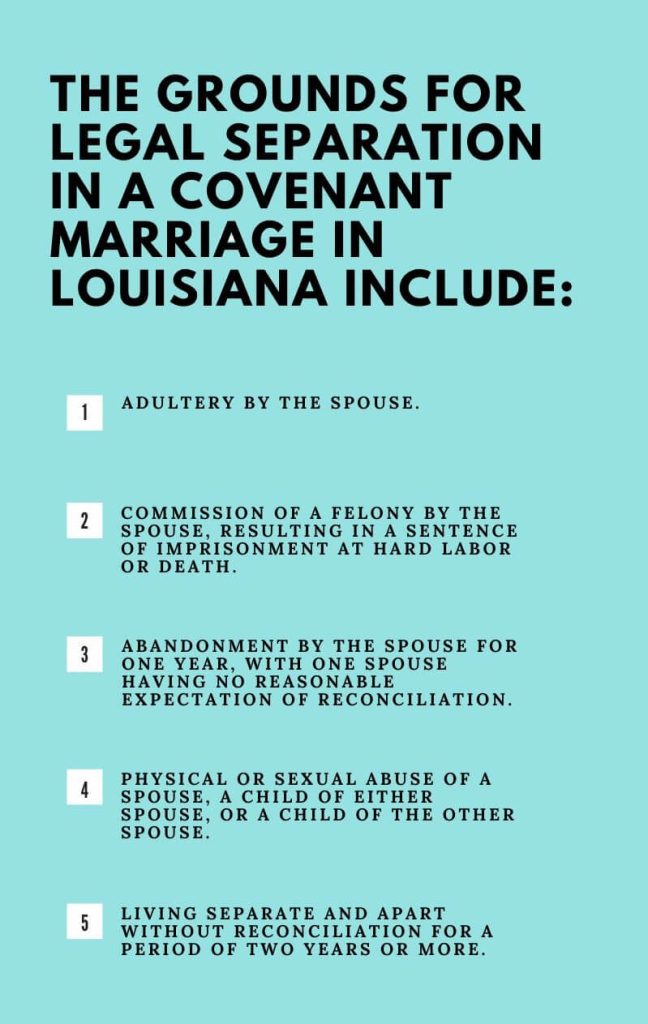Legal separation and divorce in Louisiana have distinct implications. While divorce officially ends a marriage, legal separation allows couples to live apart without terminating their marital status. In Louisiana, legal separation is recognized as a separate legal action only in covenant marriages. A divorce is the primary option for couples seeking to end their marriage. Understanding the differences between legal separation and divorce in Louisiana is crucial when making decisions about property division, alimony, child custody, and other legal matters.
Is There a Legal Separation in Louisiana?

Legal separation in Louisiana is only possible for couples in a covenant marriage. It is no longer available for spouses who have a traditional marriage; they can end their marital relations by filing for a fault or no-fault divorce in Louisiana.
Louisiana recognizes two types of marriage: traditional and covenant. The difference between them is that during a traditional one, couples can file for divorce at any moment if they have the appropriate grounds for it and meet the legal requirements.
A covenant marriage is a special arrangement in which parties agree that their marriage will last forever. It is concluded mainly for religious reasons. To get permission for a covenant marriage, spouses should learn about the rules and consequences of such marital bonds in advance and go through counseling. They should also understand that getting a divorce will likely be difficult and possible only under limited circumstances.
To file for separation in Louisiana, spouses need to submit to the court a request and an agreement on child custody, visitation, support, etc., that will guide their relationships when living apart. A plaintiff should file in the parish of their residence or where a defendant lives.
According to Louisiana separation laws, couples who have a covenant marriage must have legal grounds for separation, the list of which is limited. After filing, spouses should go through marital counseling before the court can consider their separation request. Counseling is needed to try to reconcile and show the court that spouses did everything possible to save a marriage.
If a couple has minor children and cannot agree on child-related issues, the judge will determine how the parental responsibilities will be shared between parties based on the best interests of kids. The court will also decide on the division of assets and liabilities, taking into account the joint and separate ownership of spouses.
It is important to distinguish between a legal separation and a separate living period, mandatory for spouses during a no-fault divorce; these are two different concepts.

Separation Period Before Divorce

A separation period before divorce in Louisiana may not be required if both spouses agree to the divorce.
You must comply with the mandatory separation period to get a divorce in Louisiana for no-fault grounds. Spouses in a traditional marriage do not have an option of filing for legal separation in Louisiana; living separately and apart for a specified period is enough to obtain a no-fault divorce.
During this time, spouses can agree on the terms of their breakup, prepare the necessary papers, attend parenting classes, etc., to get ready for the future divorce.
To get an answer to the question, “How long do you have to be separated before divorce in Louisiana?”, you need to analyze the circumstances of your case. The required separation period is:
- 180 days if spouses do not have children under 18.
- 365 days if parties have minor children.
- 12 months or 18 months, if there are children involved, from the moment you got a legal separation order if you have a covenant marriage.
- 2 years if you are in a covenant marriage and did not apply for legal separation before.
In fault-based divorces, spouses do not need to live separately. If one party during the marriage was accused of adultery, certain acts of abuse, or was convicted of a felony and got a death sentence or imprisonment at hard labor as a punishment, dissolution of marriage can be granted relatively quickly.

When Do You Need to Apply for Legal Separation?
If you are in a covenant marriage in Louisiana and want to file for legal separation, one of you must have been a resident of the state for at least one year. Grounds for legal separation are based on fault and can be:
- Adultery.
- Acts of physical or sexual abuse against another party or a child.
- Imprisonment for a long term for committing a serious crime.
- Alcohol or drug abuse (habitual intemperance) that causes harm or suffering to another spouse.
- Abandonment for a year or more where the abandoning party is not going to return to cohabitation.
If your spouse did not engage in any misconduct during your covenant marriage, you have to file for a legal separation in Louisiana on the ground of living apart for two years, provided that during this time, there was no reconciliation between you.
In most cases, spouses in a covenant marriage choose a legal separation instead of a traditional divorce process in Louisiana if they:
- have some objections to divorce;
- want to stay married but live separately and have an agreement on child custody, visitation, maintenance, etc.
- do not want to lose federal or tax benefits they got during the marriage;
- want to keep the health insurance that may be lost in the case of divorce.
Legal Separation and Divorce in Louisiana: Key Differences

Legal separation and divorce are two distinct legal procedures, although they both lead to the end of the marital relationship. There are several main differences between them:
- legal separation is allowed only for spouses who have a covenant marriage; couples in a traditional marriage can only file for a divorce.
- divorce officially finalizes the marriage, and spouses become legally single and can remarry if they wish. During a legal separation, the parties remain married, even if they live apart. Separation does not allow a couple to remarry someone else until they get a formal divorce. Any wills and trusts created during a marriage will still be valid during a legal separation.
- if a couple has a traditional marriage, fault-based grounds for divorce in Louisiana can be adultery, physical or sexual abuse, and a felony conviction. In covenant marriages, according to Louisiana divorce laws, abandonment for a period of one year or more and habitual intemperance will also be reasons for legal separation, in addition to mentioned grounds for divorce.
- If spouses in traditional marriage file for a no-fault divorce, they must live apart for 6 months or a year, depending on whether there are minor children involved. For spouses in a covenant marriage, this period is increased to 2 years.
What is The Best Option in Your Case?
Divorce is the only way of ending marital relationships for spouses in a traditional marriage. They can initiate the marriage termination process based on no-fault grounds of living separately or fault grounds.
If you have a covenant marriage and do not want to divorce for religious or other reasons, a legal separation in Louisiana may be the best solution for you. However, if you want to end the marriage completely and be able to remarry, a legal separation will not be a suitable option, and you will have to contact a family lawyer to find out how to file for divorce in a covenant marriage.


Toby Releya is a seasoned family law expert, who has written hundreds of articles about divorce. As an avid researcher with experience in law analysis, Toby offers readers a unique perspective on legal matters surrounding the divorce process. When not delving into the intricacies of family law, Toby enjoys exploring the great outdoors, visiting national parks across the US, and photographing his adventures on the go.



